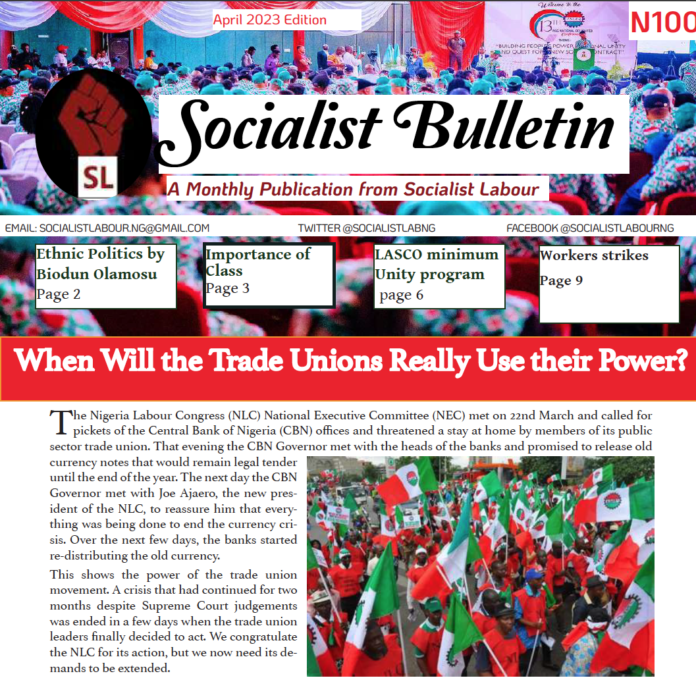When Will the Trade Unions Really Use their Power?
We need the full implementation of the NLC Charter of Workers Demands. Until all these demands are actually implemented we need effective protests and strikes to be organised by all trade unions. We need maximum solidarity to improve our lives. Unite we stand! Divided we continue to fall!!
Socialist Bulletin April 2023
Download Read and share
April-2023-Socialist-Bulletin-Download
How Can Socialists Be Successful in Elections?
IBRAHIM MUHIMMAND MAIKARFI
The more Socialist Labour supporters we have available, the more chances of changing the courses of the lives of the workers and individuals in the community for the better.
The major challenges include:-
Lack of awareness of the socialist movement among the labour...
SOLIDARITY IS THE ONLY WAY
by Uche Okafor
Comrade Ajaero’s (new NLC - Nigeria Labour Congress, President) approach to labour agitation may not yield the needed result. Without solidarity across the trade union movement, we may not get the result we want. Let us pursue solidarity with all the energy and resources we have.
If there...
Trade Union Unity and Solidarity Can Reverse Our Suffering
After poorly managed elections and a result that is disappointing for many, we need to continue the struggle where the working class is strongest: work place / trade unions. Elections are important, but they are dominated by money and coverage in the mass media, including television, radio and the newspapers. These are all owned by the rich...
World Economic Crisis
The global economy is expected to slow down this year, with many countries facing a recession.
ELECTIONS THE CHALLENGE AND ALBATROSS OF SOCIALIST TRANSFORMATION IN NIGERIA
Most often, people use the terms capitalism and socialism in reference to socio-political rather than economic systems/models.
The Poor Are Dying Because the Corrupt Elite Are Fighting Amongst Themselves
We are all suffering because the tiny corrupt elite are fighting amongst themselves. The central bank created a scarcity of Naira notes in a vain attempt to stop vote buying. The fuel marketeers are refusing to supply enough fuel because of disputes over subsidy and the price of petrol.
Who Dey Giv Us Dis Kain Leada Dem?
Steve Bode
We dey always talk one thing
wey I no undastand.
We dey always talk am say:
‘Na God dey giv pipo leada’
Pastor dey always tell us say
make we dey pray for awa leada dem









